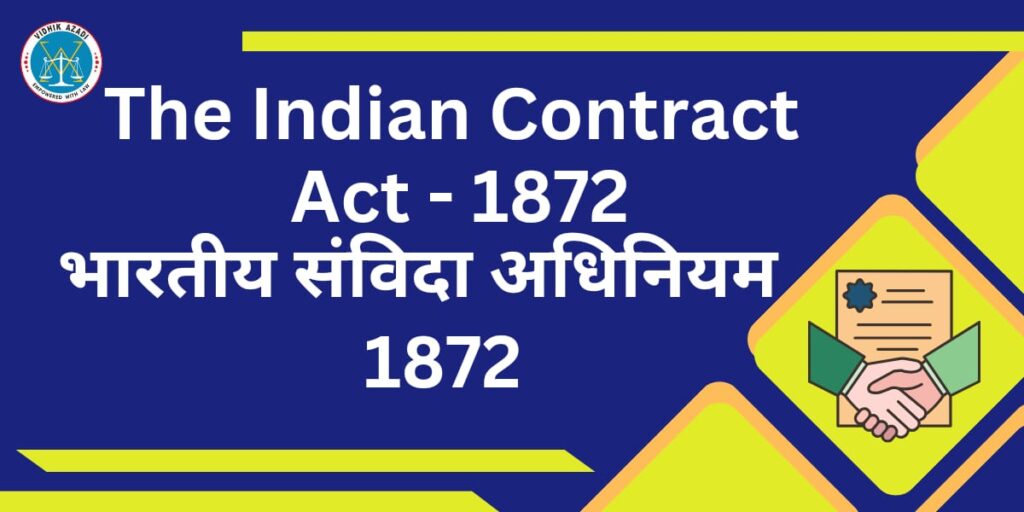The Indian Contract Act

The Indian Contract Act, 1872
The Indian Contract Act, 1872, is a comprehensive statute that governs contract law in India. It defines and regulates the formation, performance, and enforceability of contracts. It determines the circumstances in which promises are made by the parties to a contract with legal bindings. For a valid contract there must be a proper agreement. An agreement is made when one person (the offeror) makes an offer to another person (the offeree), and the offeree accepts it. For an agreement to become a contract, it must be enforceable by law.
The proposal (offer) by one party and its acceptance by the other party are crucial. The acceptance must be absolute and unqualified with proper consideration. It must be lawful and can be in the form of an act, abstinence, or promise. The parties involved must have the legal capacity to contract. This includes being of sound mind, not disqualified by law, and being of legal age (18 years and above) with free consent not caused by coercion, undue influence, fraud, misrepresentation, or mistakes. The objective of the contract must be lawful involving illegal activities.
Formation contracts are Express contracts (terms explicitly stated), implied contracts (formed by actions), and quasi-contracts (imposed by law to prevent unjust enrichment). Validity contracts are Valid contracts (enforceable by law), void contracts (not enforceable by law), voidable contracts (enforceable at the option of one party), and illegal contracts (prohibited by law). Performance contracts are Executed contracts (completely performed), executory contracts (yet to be performed), unilateral contracts (one party’s promise in exchange for an act), and bilateral contracts (mutual promises).
When a party fails to fulfil their contractual obligations, breach occurs. Remedies include damages, specific performance, and injunctions. Compensation is awarded to the aggrieved party for losses suffered due to the breach. Court orders the party to perform their contractual duty and prevent a party from doing something. Guarantee involves a third party assuring the performance. Bailment involves the Whereas Indemnity involves one party promising to save the other from loss. transfer of possession of goods for a specific purpose, while pledge involves bailment as security for a debt. One party (agent) acts on behalf of another (principal) and creates a legal relationship.
भारतीय संविदा अधिनियम, 1872
भारतीय अनुबंध अधिनियम, 1872 (Indian Contract Act, 1872) भारत में अनुबंध कानून को विनियमित करने वाला प्रमुख कानून है। यह अनुबंधों के निर्माण, प्रदर्शन और प्रवर्तन को नियंत्रित करता है।एक अनुबंध एक समझौते से उत्पन्न होता है। एक समझौता तब बनता है जब एक व्यक्ति (प्रस्तावक) दूसरे व्यक्ति (स्वीकारकर्ता) को प्रस्ताव करता है, और स्वीकारकर्ता इसे स्वीकार करता है।किसी समझौते को अनुबंध बनने के लिए कानूनी प्रवर्तन योग्य होना चाहिए। प्रस्तावक द्वारा प्रस्ताव और दूसरे पक्ष द्वारा उसकी स्वीकृति महत्वपूर्ण है और प्रतिफल के रुप में प्राप्त मूल्य वह है जो पक्षों के बीच आदान-प्रदान होता है। यह वैध होना चाहिए और यह एक कार्य, परिहार, या वादा के रूप में हो सकता है।संविदा मे पक्षकारों को अनुबंध करने की कानूनी क्षमता होनी चाहिए। इसमें विवेकपूर्ण मानसिक स्थिति, कानून द्वारा अयोग्यता नहीं, और कानूनी आयु (18 वर्ष और उससे अधिक) शामिल हैं। सहमति स्वतंत्र होनी चाहिए, यानी किसी दबाव, अनुचित प्रभाव, धोखाधड़ी, गलत प्रस्तुति, या गलती से मुक्त होनी चाहिए। अनुबंध का उद्देश्य वैध होना चाहिए। अवैध गतिविधियों से संबंधित अनुबंध अवैध होते हैं। कुछ समझौतों को कानून द्वारा अवैध घोषित किया गया हैं, जैसे व्यापार, विवाह, या कानूनी कार्यवाही में बाधा डालने वाले समझौते।
निर्माण के आधार पर स्पष्ट अनुबंध, अंतर्निहित अनुबंध, और न्यायसंगत अनुबंध; वैधता के आधार पर वैध अनुबंध, अवैध अनुबंध, अस्वीकृत अनुबंध, और गैरकानूनी अनुबंध और प्रदर्शन के आधार पर निष्पादित अनुबंध, क्रियान्वित अनुबंध, एकपक्षीय अनुबंध, और द्विपक्षीय अनुबंध को अंतर्निहित किया गया है। पक्षकारों को अपने अनुबंधीय दायित्वों को सहमत रूप से पूरा करना चाहिए नही तो वह गैर-प्रदर्शन अनुबंध के उल्लंघन की ओर ले जा सकता है। अनुबंध का विमोचन प्रदर्शन, आपसी समझौता, प्रदर्शन की असंभवता, समय की समाप्ति, कानून का संचालन, या उल्लंघन द्वारा हो सकता है। जब एक पक्ष अपने अनुबंधीय दायित्वों को पूरा करने में विफल रहता है तब उपचार में हर्जाना, विशिष्ट प्रदर्शन, और निषेधाज्ञा को शामिल किया जाता हैं।उल्लंघन के कारण हुई हानि के लिए पीड़ित पक्ष को मुआवजा देना हर्ज़ाना है। न्यायालय द्वारा पक्षकार को अपने अनुबंधीय कर्तव्य को पूरा करने का आदेश देना विशिष्ट प्रदर्शन है जबकि न्यायालय द्वारा किसी पक्ष को कुछ करने से रोकने का आदेश देना निषेधाज्ञा है।
विशेष प्रकार के अनुबंध के तहत प्रतिपूर्ति में एक पक्ष दूसरे को हानि से बचाने का वचन देता है। गारंटी में एक तृतीय पक्ष अनुबंध के प्रदर्शन का आश्वासन देता है। धारण में विशेष उद्देश्य के लिए वस्तुओं का हस्तांतरण होता है, जबकि गिरवी में ऋण के लिए सुरक्षा के रूप में वस्तुओं का हस्तांतरण होता है।
